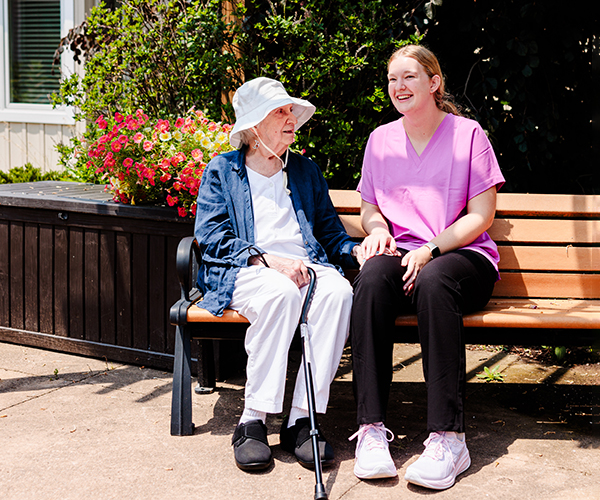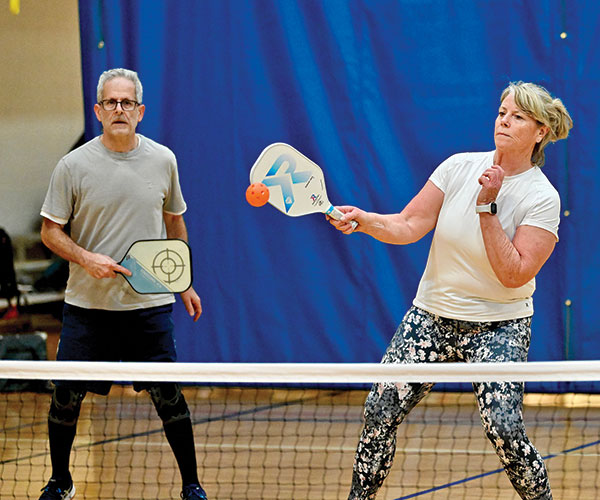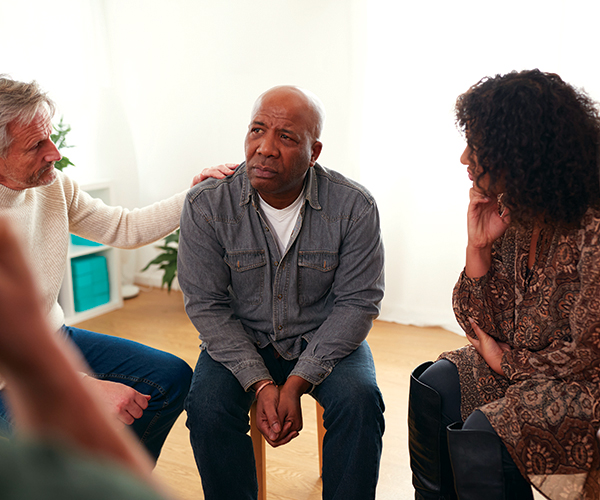Linda Elliott's favorite part of her job is her first hour at work. She's the administrator of the Benjamin Rose Adult Day Program in Cleveland Heights, and what happens at the start of her day carries her through the rest of it.
As Elliott watches and helps her staff welcome the program's clients, she fills up on the lighthearted banter.
Some clients walk in with the help of canes or walkers. Others are in wheelchairs. Some come in private cars, while others are picked up by the program's vans. Staff members greet them, take coats and pass out nametags.
"How are you doing today, Mr. Smith?"
"Oh, I'm still kicking, but not too high."
"You didn't party too much this weekend, did you?"
Everybody laughs and another day starts off with a smile.
"I love it when they come in, because everybody's laughing and they're so ready to be here," Elliott says. "They're comfortable here because, basically, they all have the same needs. So if someone forgets something or repeats themselves, so what? No one stands out here because of being different."
Benjamin Rose is home to these seniors during the day, which allows some of them to keep their own homes at night. That's one of the benefits of adult day services: With help, an older adult can maintain his or her independence a little longer.
Adult day services are "for people who don't need to be placed into a residential setting, but who can benefit from socialization and structure in their day," says Jim Rogerson, a vice president at the Eliza Jennings Senior Care Network. "It's also important for the adult caregivers who need a break in their days. . . . The older adults can spend the day with us, the afternoon, one day a week or five days a week."
Several other longstanding local elder-care networks feature adult day services. Like Benjamin Rose and Eliza Jennings, Judson Manor at University Circle, Beachwood's Menorah Park, A New Day in Lakewood and others have been around for years.
Yet adult day services are relatively scarce in the Cleveland area. A 2002 study by the Wake Forest University School of Medicine found that the Cleveland area and the state of Ohio are underserved in the adult day services field.
Ohio has some 100 adult day centers, while Cuyahoga County is home to only about 15. The study determined that the state needs 260 more such centers to adequately serve Ohio's elderly; Cuyahoga County alone needs 42 more.
Like any other business, some adult day programs make it and some don't. Long-timers in the field have watched programs come and go. The lack of state funding has been a problem for some startup programs. But the big names in the industry here know what they're doing and they do it well.
Rogerson and the folks at Eliza Jennings recently had the chance to start from the beginning, to do things exactly as they wanted. The January opening of Acacia Place, the adult day services branch at Jennings, shows they did it right. The result of a 2 1/2-year, $6.5 million renovation, Acacia Place offers a variety of activities in several different rooms, one of which is a state-of-the-art multisensory experience.
The multisensory room is dimly illuminated and smells of lavender. Nature scenes can be projected on a wall and colored bubbles travel through floor-to-ceiling tubes. There is a ladder of lights and a fiber-optic waterfall. Every feature is intended to induce a sense of calm and well-being.
"We don't just turn everything on at once," explains Margaret Carlin, the director at Acacia Place. "We would see which one of these features is appropriate and elicits the response — maybe a happy response or a calming response — that we want from that participant. It does help calm a person who is agitated, but you need to know the participant and anticipate what will be needed in each case. Everything in this room is very safe and appropriate for the participants. They really love it in here."
"Bill," for example, who tends to become sullen late in the day, loves seeing the nature images projected on the wall. His eyes brighten the moment he sees them. "Look at the deer," he says, noticeably more cheerful almost immediately. "That's nice."
Another participant might like the butterflies more, or maybe a different scent in the aromatherapy machine (such as cedarwood, geranium or sweet marjoram), which is why Carlin and her staff get to know each participant individually.
"The first thing we'll do in here is an assessment," Carlin says. "We might start with the waterfall or the ladder lights. By knowing our participants, we can see patterns in their behavior: Maybe in the afternoon they get tired and their ability to focus is limited. We might bring them in here a half an hour before that time comes and help them calm down, so that when they're reintroduced into that [trigger] time, it will allow them to be calmer and cooler."
Elliott usually suggests that new participants at Benjamin Rose start out coming two days a week to get accustomed to the program. But she says it usually isn't long before she gets a call from a family member, saying, "My mom's getting dressed and standing by the window every day looking for the van."
There are many reasons why an adult caregiver might choose adult day services to help. The fact that Mom or Dad loves it is no small factor. Neither is the respite it provides to the caregiver. Adult day services can offer medical and dental care, bathing and grooming services, and physical and occupational therapy. Freeing up the caregiver from many of these errands and appointments allows more time at home with their older relative. And they're cost-efficient, often less expensive than home health care or personal nursing (which may run up to twice what day services cost, on average).
What many of the older adults love about the programs, though, is the socializing. Judson Manor's Day Enrichment Center offers guided day trips, films, crafts, gardening, cultural experiences and book discussions. At Acacia Place, shelves hold baskets full of conversation starters.
For example, the "baby box" includes a pacifier and baby booties, and the "kitchen box" holds silverware and cooking items. A box full of postcards generates conversations about where participants have traveled or would like to visit.
"This way, they can reminisce about babies or grandchildren, where they've traveled or whether they liked to cook or not," Carlin says. "Some people are very tactile — they like to fold and unfold the clothes in the baby box. You can generate a million conversations from these boxes. You're limited only by your own imagination, but we give them some tools to get the conversations going."
Then there are the responses participants sometimes have after becoming involved in adult day services. Elliott recalls a participant who was in her program for 14 years. "Her original diagnosis was Alzheimer's, and she ended up leaving us only because she got so physically frail in her 90s," Elliott remembers. "But her doctor was amazed because she was so much more cognitively alert after 14 years of this."
Carlin sees the same sort of impact.
"By having them participating in a day center's programming, they're getting exercise and moving more, we're keeping them well-nourished and their functional ability usually improves," she says. "At home, they may be sitting more and become less mobile, or they might confuse their medications. Their ability to stay home longer lengthens when they participate in day-center programming."
Yet one of the inevitabilities of adult day center programming is that participants eventually leave. "It's horrible when someone leaves or dies," says Elliott. "I don't think caregivers realize just how close we get to their family members."
Sometimes, a participant simply moves on to another level of care — assisted living perhaps, or a nursing home. It's still a goodbye, but Elliott's staff throws a "graduation" party to recognize the contribution the participant has made to her program.
"They all bring something different," Elliott notes. "And we treasure every one."



